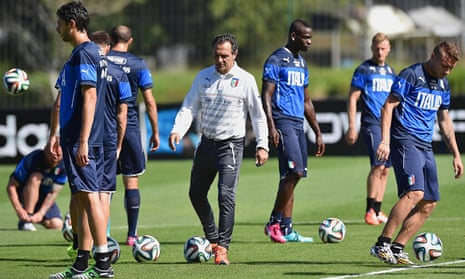The contract was agreed in March, it was signed towards the end of May and it gave Cesare Prandelli two more years in charge of Italy, taking him through to the finals of Euro 2016. To put it another way, the Italian Football Federation had offered a legally-binding assurance over the future of their manager before a major tournament.
In the trigger-happy world of Italian football, where managerial P45s are flicked about like cards from a croupier, this felt unusual. It has to be said that if Prandelli’s team were to crash and burn at the World Cup finals, the Federcalcio would most likely sack him anyway. But it has been hard to see the show of faith in Prandelli as anything other than the heartiest of endorsements.
The 56-year-old’s thoughts are consumed at present by how to outmanoeuvre Roy Hodgson and England, as he did at the quarter-final stage of the last European Championship and he is driven by the necessity of taking an assured first step in World Cup Group D, which contains a third former champion in Uruguay. It is excruciatingly tough to call. As always in Italy, the excitement has come to be underpinned by angst and drama.
But to get to this point and one where, if he remains in situ until the next Euros, he would become the first Italy coach to last more than five years since Enzo Bearzot (1975-86), the 1982 World Cup winner, Prandelli has done an awful lot right.
When he signed the new contract, he spoke of gratitude and pride but it was another soundbite that cut to the heart of what he has done. “The people who control the national team are well-meaning people and by offering me this extension, they have got over the obstacle of relying only on results,” Prandelli said.
The results have been impressive. Since taking over in the wake of the debacle that was the 2010 World Cup, when Marcello Lippi’s team finished bottom of a group that contained Paraguay, Slovakia and New Zealand, Prandelli’s Azzurri have lost only three competitive ties – the Euro 2012 final to Spain, the last group phase tie at the 2013 Confederations Cup to Brazil, when both nations had already qualified and the semi-final of the competition, to Spain on penalties. They did not lose during qualification for the European Championship or this World Cup.
But Prandelli believes that there has been something greater at stake, something fundamental and deeply principled. It involves the values that the team stands for, and how those that wear the blue shirt are perceived at home and abroad. Under Lippi, who conquered the world in 2006, there was prickliness and the mentality of a siege that led up to the implosion at the last World Cup.
Prandelli, though, has not only rebuilt the team – there are just six survivors from South Africa in the squad for Brazil – he has smoothed away the perceived negativity and gamesmanship to turn Italy into a more attractive and likable side. He has gone a long way towards reconnecting the team to their supporters.
One of his first moves was to introduce a code of ethics, under which he would not select a player who had behaved badly for his club. He wanted to clamp down on violent gestures and show, in effect, that winning ought not to come at any cost. “One must win trying to be loyal and being a sportsman,” Prandelli said, towards the end of his first season in charge. “Our ethical code goes on at all costs, otherwise we would not be credible.”
Prandelli has dropped Daniele De Rossi three times, Mario Balotelli and Dani Osvaldo twice and Leonardo Bonucci once. He also excluded Mattia Destro for two days of a training camp in April. All of them had been guilty of acts of serious indiscipline – such as throwing punches, elbows or massive hissy fits – and Prandelli’s punishment came over and above any club suspensions.
Balotelli, for example, was excluded for the European Championship qualifier against Slovenia in March 2011 after his red card at Manchester City for lifting his foot dangerously against Dynamo Kiev’s Goran Popov in the Europa League. Prandelli also left him out of the friendly against the United States in February 2012 after his four-match ban for stamping on Tottenham Hotspur’s Scott Parker, again while the Milan striker was at City.
De Rossi is a serial puncher and elbower and his most recent offence – sticking one on Mauro Icardi during Roma’s draw with Internazionale – saw Prandelli drop him for the Spain friendly in March. It was tempting to wonder whether the midfielder would ever learn but Vincente Del Bosque, the Spain manager, suggested that other nations could learn plenty from Prandelli. “We could do with adopting a code of ethics ourselves in Spain,” Del Bosque said.
There has, perhaps inevitably, been controversy; questions as to where the line of acceptability should be drawn and accusations of double standards, most notably over Giorgio Chiellini. The Juventus defender elbowed Roma’s Miralem Pjanic in the penultimate game of the Serie A season to raise the prospect of a World Cup ban only for Prandelli to spare him. Where was the code now, wondered Prandelli’s critics and Roma fans? It is one thing to suspend a player for one qualifier or a friendly, they said, but if the ultimate sanction was not meted out, it was all essentially hot air.
In their hearts, though, every Italian knew that it would have been foolish to omit Chiellini from the World Cup squad, and not only because they are hardly blessed with top defenders at the moment. (It is a sign of the shortage in the department that Prandelli has pushed to naturalise and select Gabriel Paletta, the 28-year-old Argentina-born one-time Liverpool centre-half.)
Chiellini’s three-game domestic ban has carried over into next season and so Prandelli retains the option to censure him then. To some extent, the manager has tied himself into a knot but, for better or worse, he surely felt that a World Cup ban for his best defender would have been too strong.
Prandelli’s sense that there is more to life than football was fired by personal tragedy – his wife, Manuela, died in 2007 after an eight-year battle against cancer. Prandelli had left Roma in 2004, shortly after joining them, to be beside his childhood sweetheart at a critical stage of her illness. “People were surprised but it was surely a decision that everyone would take,” he said. “Then again, football is afraid of normality.”
Upon succeeding Lippi, Prandelli demanded that his players became more available to the public – “Signing an autograph cannot possibly be a hassle,” he said – and the spirit of openness has defined his tenure. Balotelli has thrived. “Mario needs love,” Prandelli has said, and he has got it from his manager, even if it has been of the tough sort at times. Balotelli repaid Prandelli with the two goals that sank Germany in the Euro 2012 semi-final. He has his sights set on more in Brazil.
Prandelli has integrated other young players, namely Marco Verratti, Ciro Immobile and Lorenzo Insigne and attacking football has become the priority. If there are questions about the defence, there are mouth-watering creative options, particularly in central midfield. It all feels rather un-Italian.
Tactically, Prandelli is ultra-flexible. “I have a dream of winning the World Cup by using seven different formations in seven matches,” he has said, and the shape-shifting routinely occurs on numerous occasions during the same game.
If 4-3-1-2 is just about the favoured system, Prandelli also likes to load the midfield and play with one up front or he can switch to 4-3-3 and use three strikers, with or without a false nine. He can even play De Rossi as one of three central defenders flanked by attacking wing-backs. The moves are meticulously tailored for each opponent and situation.
The heat is on. If the run to the European Championship final came as a pleasant surprise, the expectation levels have now ratcheted up and Prandelli has found himself under intense scrutiny. As well as the furore over Chiellini, the decision not to pick Giuseppe Rossi or Destro, the strikers with the best goals-per-minute ratio in Serie A, has been picked apart. Prandelli felt that Rossi was not ready after his latest serious knee injury. Even the logistical preparations have been criticised.
Prandelli, though, has faith; in the players, in what he has built and in himself. Italy are ready to author a more positive World Cup chapter.






